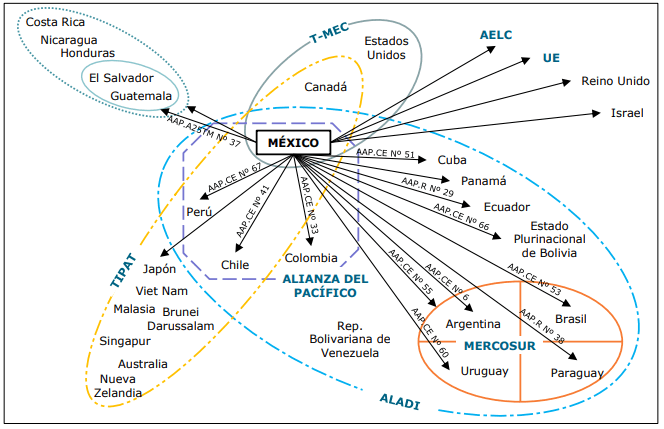Mexico has signed numerous trade agreements, from sectoral to other deep trade integration agreements, according to information from the World Trade Organization (WTO).
Among others, Mexico is a party to the Latin American Integration Association (LAIA), the Treaty between Mexico, the United States and Canada (USMCA), the Comprehensive and Progressive Agreement for Trans-Pacific Partnership (CPTPP) and the Pacific Alliance.
Within LAIA, Mexico has several partial trade agreements that focus only on trade in goods.
The agreement with MERCOSUR is limited to the automotive sector.
Between 2017 and 2022, three trade agreements entered into force for Mexico: the CPTPP in 2018, the T-MEC in 2020, and the Trade Continuity Agreement with the United Kingdom in 2021.
These agreements cover both trade in goods and services.
Both the CPTPP and USMCA include provisions on new issues, such as digital trade, SMEs, trade in sustainable goods, and the environment.
Trade agreements
The CPTPP was signed in 2018 and came into force the same year for Mexico, with all Parties except Vietnam. The agreement with Vietnam entered into force in 2019.
This treaty incorporates almost all provisions from the Trans-Pacific Partnership Agreement (TPP).
Mexico maintained its market access commitments from the TPP under the CPTPP.
As agreed, Mexico follows the same tariff reduction schedule with all Parties, except Japan. Tariff reduction will end in 2033, and for Vietnam, it will end in 2034.
Mexico also negotiated tariff rate quotas for certain dairy products and products with natural milk components.
These quotas apply to all Parties, except Chile and Peru. The quota for natural milk components does not apply to Japan.
Quota volumes will gradually increase until 2028, after which they will remain unchanged.
United States and Canada
The USMCA was signed in 2018, amended in 2019, and came into effect on July 1, 2020. It replaced the North American Free Trade Agreement (NAFTA), which had been in force since 1994. However, some provisions of NAFTA may still apply on a transitional basis.
The USMCA includes new issues, such as trade facilitation, digital trade, environmental protection, competitiveness, and labor rights.
Several provisions were updated, including those related to rules of origin, government procurement, investment protection, and intellectual property rights.
Sectoral annexes were added to harmonize technical requirements for specific products.
Additionally, the treaty states that hydrocarbon deposits in Mexican territory are inalienable property of the State. The USMCA also includes a review clause, allowing for an extension of its initial 16-year term.

